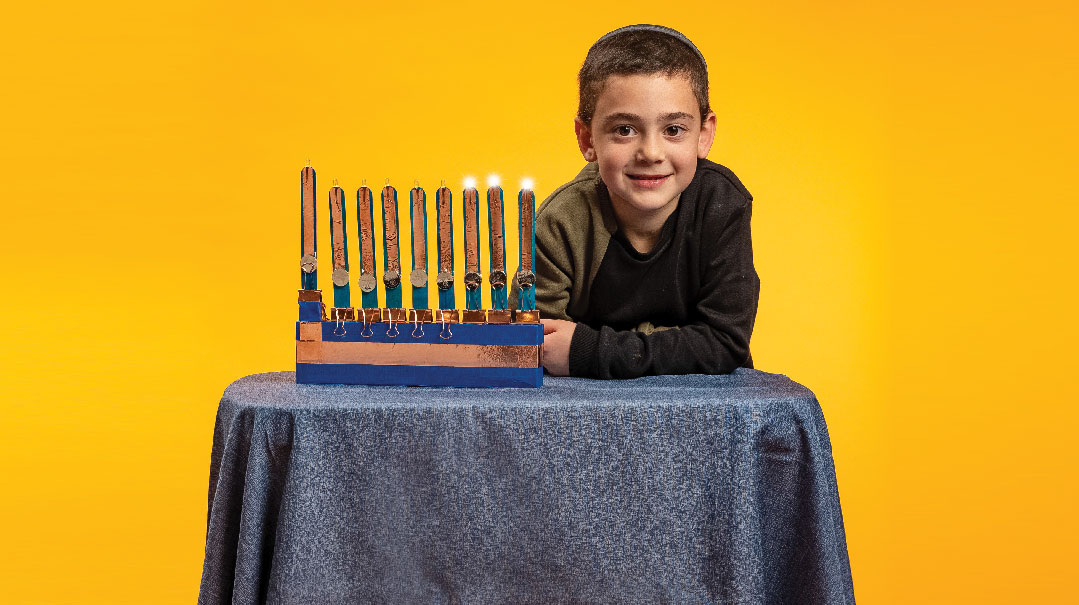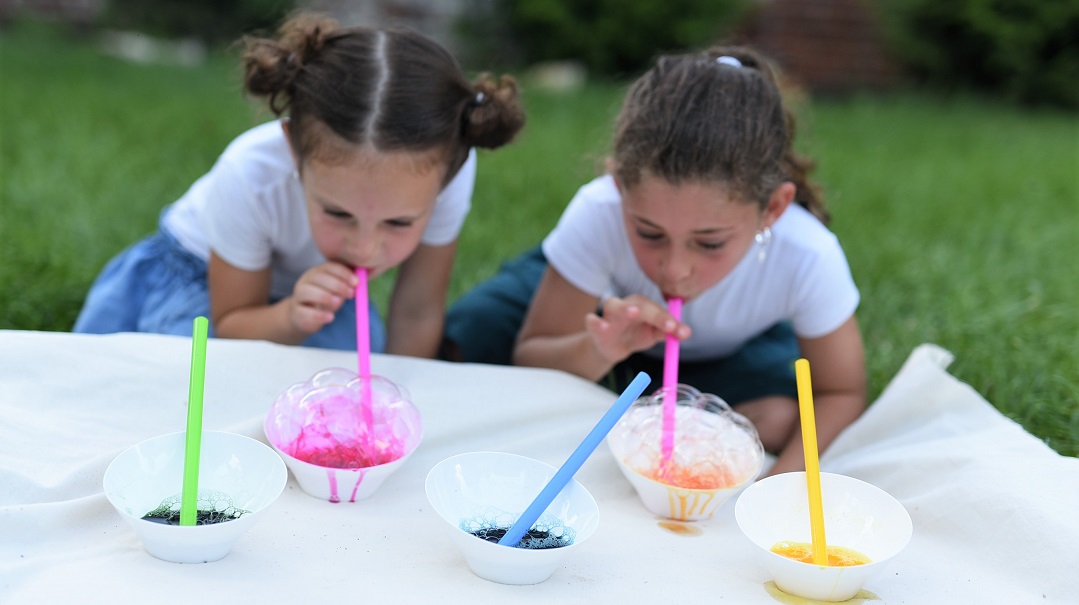All in the Family
| May 13, 2020School psychologist Zipora Schuck offers advice and insight on what parents can do to get through — and gain from — this unique time

Before figuring out what you can give to your children, says Zipora, make sure you have the resources you need to parent effectively. “You need to be assured that you can be calm despite all the difficult stresses — and there are many right now. Almost every school has people who are well-connected so it might just be a matter of reaching out. Schools know which organizations can help financially and which agencies are providing virtual therapy.”
Help is almost easier to access now, considering the plethora of now-virtual resources. “You may not even need to reach out to the school,” Zipora continues. “Sometimes it’s just about taking a deep breath, admitting that you’re struggling and need help, and then thinking about where you can access the support.”
Maximize the Modeling
Once parents feel like they have the tools they need, they can start thinking: How do we want our children to come through this time?
The trick to nurturing the growth you hope to see? Model it yourself. “Most of your children’s memories will be of their interactions with you. We can maximize those by making sure they’re of things we want them to absorb,” says Zipora. The more parents model these five basic behaviors, the stronger they’ll be mirrored in their children:
1. Remember that it’s temporary.
This lockdown feels like it’s going on forever, but it will eventually come to an end. We’re not stuck here for the rest of time.
- Have faith.
There are so many ways for parents to strengthen their emunah, whether by talking to a friend, watching a short clip like Meaningful Minute, or listening to a shiur as they fold laundry. It’s important for parents to take in as much as they can because no one can pour from an empty pitcher.
- Keep calm and carry on.
Everyone loses it from time to time, so it’s okay to say that this is uncomfortable, unexpected, hard — or all three — but when a parent says that, it needs to come along with “but I’m trying.”
- Show resilience.
Parents have already proved their resilience by raising their kids up until now. Capitalize on those skills. Everyone has specific strengths as a parent — whether being affectionate, flexible, organized, etc. — and for the most part, those strengths have been enabling them to raise good kids. Parents need to trust those strengths now. Some systems may need tweaking, but parents shouldn’t pressure themselves to reinvent the wheel.
In cases where parents feel like something really isn’t working, look at what is. Then utilize those methods more.
- Be flexible.
It’s almost impossible to hold onto rigidity now. Things are changing day-to-day, and the most feasible option is to embrace the adjustments. If parents approach this time with flexibility, it will be easier for both them and their kids to handle the rigors.
Run the Marathon
Most people never wanted to parent, work, and homeschool all at once. Yet it’s the reality now — and quitting isn’t an option. “All that parents can expect from themselves is to do their best,” Zipora stresses. She likes to think of it in terms of the New York City marathon.
Each year in November, close to 55,000 runners tie their laces and run 26.2 miles through the five boroughs of New York. “The grand prize is $100,000, but how many of the runners are there because they have a shot at it?” Zipora asks. The answer: not many. Most participants are there because they want to beat their PB, their personal best. Their goal is not to win or outrun someone else; it’s to improve.
PB is something for parents to keep in mind for themselves — and they should turn it back to their children too. “We all know our kids,” Zipora said. “We know their personalities and temperaments. We know their strengths and challenges. We know what would be considered beating their personal best, and that’s all we should expect of them.”
For some children, improving may mean joining their schools sessions and participating in the work. For others, improving may mean picking fewer fights with their siblings, taking on more responsibility around the house, or keeping their bad moods in check.
“When you recognize what a child struggles with, you can avoid falling into a trap where things spiral.” If one dislikes his school sessions, parents will know that it’s an accomplishment when he joins. On the other end, if he refuses to log on one morning, parents will know to isolate the incident and not blow it up.
“If a parent starts arguing with the child,” Zipora explains, “it becomes a much bigger deal. It will carry into lunch, then they’ll act out in the afternoon, so you’ll need to discipline them by dinner, and you’ll end the day wondering why this particular kid always argues with you.” Instead, Zipora suggests recognizing that they just wanted to skip a session and calmly working on solutions before it gets heated.
The good thing with running marathons is that there are always more races to sign up for. Even if one day doesn’t go well, the next is a new opportunity for the family to beat their PB.
Overloaded
One of the easiest things to get sucked into nowadays are the waves of information that keep crashing upon us. “Comparing ourselves to other people makes us feel inadequate, and too much information steals headspace from what we actually need to think about.” News and social media can be enticing, but dangerous.
“It’s actually helpful that the news changes every minute,” Zipora says with a laugh, “because you don’t need to worry about what you’re missing. Just remember that it will be old news in minutes anyway.”
News aside, information overload can appear as caring friends who let you know everything that they and their kids accomplished that day. “If you’re getting nervous because your friend told you that she has her kids on a schedule of color-coded 15-minute intervals — and that they learn Latin in their free time — don’t listen!” And for the parents of those children, Zipora is truly happy for you, but she kindly suggests bragging to grandparents only.
“No one needs additional reasons to think that they’re doing something wrong. We can’t compare, because no two people have the same dynamics at home.” A parent can hear one glowing update about someone else’s kids or see one look-what-we-did-today social media post, and everything deteriorates. They start wondering why their kids can’t behave, why their house isn’t staying clean, why their husbands aren’t helping much. Comparisons are the antithesis of running to beat a personal best.
If there’s one benefit to staying in the loop, it’s that social media is overflowing with great tips and ideas. Beyond that, it’s best for parents to put the lid on how much outside info they take in.
Success Breeds Success
Success breeds success — it’s not just an adage. A 2014 study by the State University of New York showed that once someone was successful, he continued to accomplish more than his counterparts who didn’t have a track record.
In light of that, keep this in mind: Zipora points out that when we split this era into three parts, the two hardest ones are already behind us. “First was the initial shock, when we didn’t know what was going on. Everything was changing by the minute, and all we heard was that death rates were increasing. We got through that.
“Then came Pesach — when many people made do under circumstances they never dreamed of. We got through that too.”
Now is the third period, which may last for another while and stretch through the summer, but families have successfully reached this point — which means they can be successful again.
As Zipora says, parents can instill the same idea in their kids. “Look to see what’s working well for them. What were they able to do? What are they mastering?” Then point it out to them. A small compliment will go a long way in building confidence, both now and down the line. “Especially because behavior that’s reinforced is repeated,” she continues. “The more attention we give the positive, the more positive we’ll see.”
Fitting It All In
“One of the biggest things people are struggling with is, ‘How do I fit it all in?’ ” says Zipora. The days start off feeling long and endless, but by nightfall parents wonder where the hours went. Zipora’s suggestion? Routine. “Routine gives kids a sense of control,” she explained. “This entire time period is so out of control, and kids feel that.” If there’s any way to set a basic structure to the day that’s not pressurizing or rigid, children will feel like they have a sense of what’s going on again. “Reiterate and reinforce good behaviors with positive attention, be transparent about what’s going on, and be intentional about what to prioritize throughout the day,” she suggests.
The Four “R’s”
The four R’s are a way to give each day purpose and a sense of accomplishment. Every section is like a drop-down menu — choose which items work best for your family.
- Religion
Yiddishkeit is the foundation of our days. “Religion” can include davening in the morning, parents saying Tehillim when they have a few minutes, listening to a shiur, or discussing a Torah concept that the kids learned in class.
- Responsibilities
Parents have to accomplish their jobs, run the house, and parent; kids have to listen to their classes and do homework and chores. Part of being responsible includes getting up and going to bed on time. This is an easy time to forget about daily responsibilities — especially for children — because there isn’t the usual urgency. However, because so much is already in limbo, kids need to be made to feel responsible. They need to know what is expected of them.
When kids are resistant and want to vacation all day, Zipora suggests sitting down and explaining that in this family, everyone has a role and responsibility. Ask, “How can we make this house run together?” Often, kids have specific reasons for being resistant. If they don’t want to join classes, find out what is it about the classes that isn’t working. Instead of allowing children to drop their responsibilities, see if they can accomplish them in a different way. If the classes are too early, can they listen to a recording later? If the house is too noisy to concentrate, is there a different location they can use?
- Recreation
Kids need to feel like they can just “be” and not have to “do” all day long. “Being” includes creative outlets, playing, moving around, reading, relaxing, or any hobbies that extend beyond the typical school day. There’s less rush these days so there’s room for kids to explore their interests. Some children may realize that they’re good bakers — others may discover that they can draw well. If a new hobby a child picked up is working, encourage it.
Recreation also includes outlets of a different kind — emotions. It’s important for kids to address and take care of their feelings. These are confusing times, and it’s okay to feel anxious. However, if parents are concerned that their child’s anxiety is interfering with sleep or playtime, reach out to the child’s school or to a professional for guidance.
- Relationships
Connecting to other people is healthy for everyone. This can mean spending quality time with the family, calling a grandparent, engaging in chesed, speaking to a friend, waving to people across the street, or enjoying time with siblings. If a rebbi or morah is available, arrange for the child to spend a few minutes chatting with them one-on-one.
“With the four R’s,” says Zipora, “we’re looking to get into a groove where we can tell our kids, ‘Wow, we took care of everything that was important for today.’ ” In that sense, each family’s routine may look different on each given day.
Try attending to each R, but don’t pressure yourself when you can’t. “One day you may be really busy with work, so taking care of dinner means that the kids eat PB and J. Another day, you may cook a gourmet meal and ditch the laundry. Sometimes you may be so busy saying Tehillim for a family friend that other responsibilities fall to the side. There will definitely be days when the four R’s don’t happen, but the most important thing is to keep juggling.”
School Days
One of the biggest responsibilities in families’ routines is schooling. “The grass is not greener on the other side,” Zipora stresses. “Schools can’t please everyone. If they give classes for one hour, people want more. If they give classes for longer, people want less. We have to realize that teachers are first responders, and they’re doing their best during very trying times.”
That being said, there are ways parents can prep their children for academic success:
- Validate in public, complain in private.
It’s crucial that parents model positivity and belief in the school. If a child is complaining their classes are boring, it’s okay for a parent to say “I know — it must be hard to learn,” but it’s not okay to follow that with “because the school is ridiculous and hasn’t updated their curriculum in years.” Validation isn’t agreement. Instead, reach out to the school and let them know that your kid is struggling, and ask if it’s possible to make the classes more interactive.
A study published in the School Community Journal (vol 8, #2) showed that when parents positively engage with the school, their children’s academics improve. The more parents validate the difficulties, without putting the school system down, the better off their children will be.
- Focus on skills.
Most kids aren’t learning the same way they normally do. Instead of stressing about what they’re missing, focus on the building-block skills they’ll need in the future. If a child is reading well, it may be okay for them to skip a language-arts class. If they’re struggling to learn math over the phone, brainstorm other ways to keep them on pace. Pinpoint the important skills and prioritize those.
- Be objective.
If something isn’t working and parents need to adjust, it helps to ask: “What advice would I give a friend in this situation?” Approaching situations objectively removes emotion from the picture; people are often surprised at the creative solutions they come up with.
Zipora described a child who was resisting his phone classes. She suggested a simple fix to the worried parents — buying him new headphones — and it worked magic. It just took a little out-of-the-box thinking, which is easier when impartial.
- Set them up.
It’s not always possible, but having a designated spot gets children in the learning mindset and avoids distractions. It also helps to have all their supplies ready beforehand — some families even pack school bags — so they’re prepared for the next day.
For some children, setup may require that parents stick around to help them get logged on. Don’t worry about obliging children instead of fostering independence. This situation isn’t permanent.
- Incentivize.
Children need to be responsible about school, but that doesn’t mean it’s easy. That’s why ice cream and games weren’t canceled — incentives still work. As long as they won’t be missing too much, parents can consider rewarding kids with a session off from school or an “early dismissal.”
Making Memories
“Do you want your kids to end this time thinking that your best part was spending time with them, or that you couldn’t wait for the school bus to come pick them up?” Zipora asked. “We’re making memories with our kids now. What message are we sending with them?”
Adding happy moments doesn’t have to be regimented. Many fun rituals don’t require a lot of work. Here are a few options:
- Refrigerator central
Designate an area as a “meeting place” where kids can engage — the fridge or a noticeboard. Hang announcements like “Supper’s at 6” or pin up a box for “comments and suggestions.” Encourage kids to add their own memos.
- Corona cafe
This can be part of the central bulletin or a project of its own. Hang the menu for breakfast, lunch, and dinner, at the family’s “Corona Cafe.” One mother hung a sign that says “Ma, there’s nothing to eat!” and then listed all the snacks children could make on their own.
- Night activities
Even though they’re living under the same roof, family members can spend the entire day engaged in their own devices. Night activities can be an exciting way for everyone to hang out together — board games, smores, or sing-alongs are all simple but fun.
- Time capsule
It sounds fancy, but it doesn’t have to be. All families need is a large bag or bin that they can add items to. What do you want to remember in ten years? What’s significant right now? (Don’t be surprised if the first item in is a mask.)
- Sentence fill-ins
Another idea for the refrigerator central is running lists the kids can add to whenever they pass. Update the lists daily or leave all the options hanging. The prompts don’t have to be huge or involved enrichment questions, just a way for kids to stop, think, and engage.
- ♣ I really miss:
- ♣ Things that aren’t canceled:
- ♣ I can’t believe we’re living without:
- ♣ The first thing I’ll do when quarantine is over:
- ♣ A good thing that happened is:
- ♣ I am excited to go back to school because:
- ♣ Things I learned to do:
- ♣ Things I realize now:
- ♣ Best part of being home is:
Most countries are nearing two months of stay-at-home orders, and time seems to be dragging on endlessly, but even when they move slowly, they are moving. “This too shall pass,” Zipora reminds us, “and b’ezras Hashem it will end with happy, healthy families.”
(Originally featured in Family First, Issue 692)
Oops! We could not locate your form.












